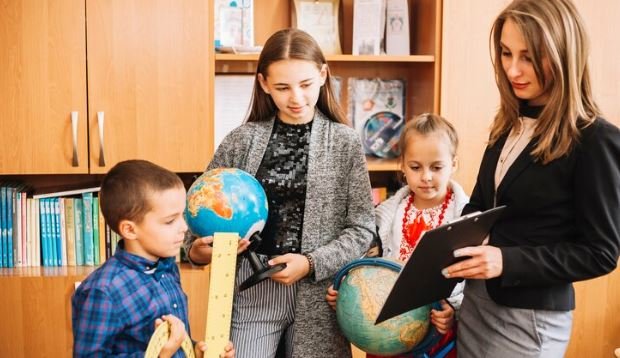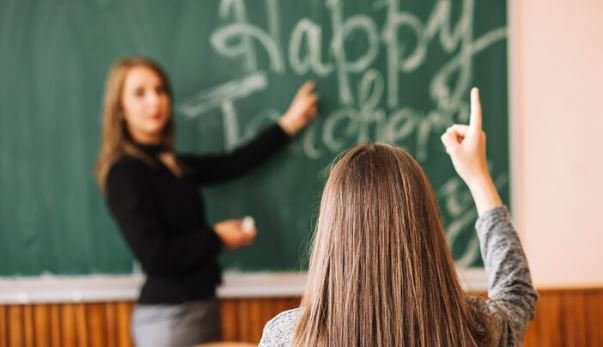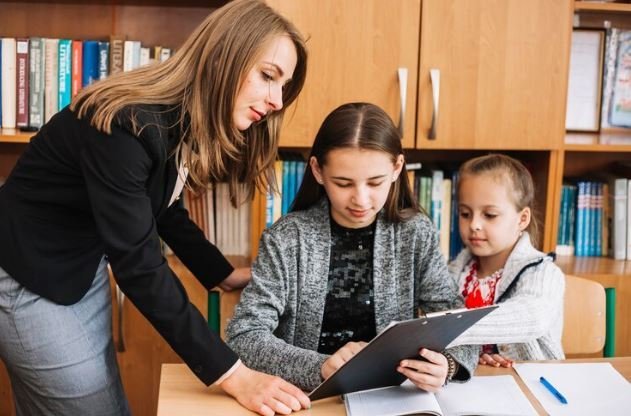Teachers have started to matter a lot in our lives. Helping us to know new things, teaching, and becoming the driving force in our life studies in every area that surrounds us has been part of transforming yourself.
A teacher has many roles and responsibilities, teaching in the classroom is just one of these. Teachers, in general, this means creating students who understand their world and are curious about everything around them learning to work well with others. Today we are going to see all the ways teachers help us, and why their role and responsibility are so important.
Teaching Lessons
A teacher is a person who teaches lessons. Teachers utilize all types of resources from books to videos, to activities and discussions for students to gain a deeper understanding surrounding their new concepts.
From learning how to read, solving math problems or science project exploration teachers walk you through so much step by step in such an easy way.
They will break down concepts in a straightforward way, answer any questions you may have, and give examples of the material so students can start to understand what is being said.
Helping Students Understand
One of the key responsibilities that teachers must carry out is related to clarity and transparency in every lesson. They understand that not every single individual learns in the same way, and they allow variation to reach out to students.
Having Trouble: When the student is having trouble, the teacher uses this time to break things down and explain them for understanding or offer extra help/practice activities. It is this responsibility that no child be left behind.
Encouraging Curiosity
Teachers are supposed to spark curiosity in your mind They do this by questioning sensitively, introducing new areas of research, and cultivating the confidence students need to experiment.
Students get interested only when they are curious. Teachers cultivate this curiosity by developing their students’ interests and empowering them to ask questions and search for answers.
Supporting Growth
Teachers need to promote the advancement of each student. This includes academic, social, emotional, and physical abilities that students require to be together to lead a secure future.
Teachers offer advice and suggestions on how to build upon the student’s skills with every new design. They congratulate students on even their smallest accomplishments and remind them not to give up when they experience failure.
Fostering a Positive Atmosphere
Ensuring a friendly climate of teaching is another task for teachers. It is a difficult thing to do well because teachers take great effort into not only making the classroom safe and welcoming but also creating an environment where individual students feel valued.
They create guidelines and norms that uphold politeness, empathy, and sharing amongst the student body. These established conditions enable our students to be comfortable and confident in participating.
Being a Role Model
Teachers are expected to be an example for their students too. They model appropriate behavior, respect for others, and maintain an optimistic outlook on life teachers also teach students important life lessons, for nothing like setting an example of hard work honesty, and perseverance. The best way to teach kids about kindness and integrity is through you, the example.
Guiding Students’ Behavior
Teachers also serve to direct the behavior of students within classrooms. Teachers guide students as to what is required of them and how the rules fall into place.
If they make an error, we take those moments to teach them valuable life lessons about responsibility and the power of decision-making. It shows teachers how to help students act so that the whole class can learn and succeed;
Planning Lessons
Every teacher has to plan lessons. Clocks Check Points Balanced Days Support for Teachers Activity schedules are carefully planned each day with what teachers need to accomplish and introduce the next lesson.
It involves thinking about what you are going to teach, how you will explain it, and identifying some activities that allow the students in your class to practice what they have learned.
A well-planned lesson means that the class runs efficiently and your students are going to move right along through their learning goals.
Assessing Students’ Progress
A teacher has one other very important duty: to know whether or not his students are making any progress. To monitor the progress, teachers take tests, quizzes, and other assignments of students.
They use this data to determine what students have learned and that they need help with. When a teacher has been able to look at what each child is up to, they can help everyone continue their learning and be sure no one gets left behind.

Communicating with Parents
It is also the responsibility of teachers to get in touch with parents. Provide parents with regular updates on their child’s performance, behavior, and the difficulties he or she is facing.
This regular communication creates a robust partnership between the teacher and parents so children can be reinforced both in school and at home. Maybe teachers would send notes or emails, and probably meet with parents on how to enhance the success of their students.
Encouraging Teamwork
Only a teacher can motivate them to work as one. Project-based, activity-oriented education where students work in conjunction with each other (either real-time or virtual concurrent learning options) In this teamwork, students are exposed to listening from others and working together towards one goal. Teachers encourage collaboration, thus developing important interpersonal skills that students will use throughout their lives.

Adjusting to Different Methods of Learning
One of the most crucial duties of a teacher is understanding and adjusting to how each student learns. They are aware that each student has a different background and may understand things differently.
There are those students who listen to learning the best way, and others need to participate by taking part in activities among others by sight. They will adjust their lessons to accommodate these varied learning styles, setting every student up for the highest possible results.
Inspiring Students
Motivating students is also a key function of the teacher. They will make a difference to the students when they demonstrate their love for what subject matter being taught and connect it with an anecdote about how other people have influenced our world in different ways.
This sense of inspiration teaches students to take great pride in their studies and hopefully inspires them to have even greater dreams. The efficiency project engages the public and inspires people to donate by giving students a great back story, which in return helps rally more motivation for those who will get behind their ideas.
Promoting Creativity
As a teacher, one important job is to inculcate creativity. Opportunities to use art, writing, and problem-solving are all types of ways that teachers encourage students to be creative.
Teachers help their students flourish in both schools as well as real life by promoting creativity that helps to develop imagination and critical thinking skills.
Future-Ready Grads
Another major function of a teacher is to prepare for the future. Teachers help students acquire the skills and knowledge that will allow them to succeed in the outside world.
It includes showing them how to problem solve, think deeply, and cooperatively work with others. In doing so, educators are both growing students and preparing them for a future that is uncertain to us.
Emotional Wellness Support
Teachers do not take emotional well-being lightly. They assist with feelings, as teachers develop a conducive environment for the kids so that they can feel free to express how are feeling inside.
They also prepare students for stress and how to process their emotions positively. Teachers, in turn, can play a vital role in supporting emotional well-being and the development of resilience learning that they are capable of coping.
Teaching Respect for Others
One of the most important ones is to teach students to respect other people. Kindness and consideration are taught to students by teachers This is done by honoring cultural, language, and ability diversity.
Not only do the teachers create an inclusive environment in which everyone plays a part and is valued, but they also foster respect.
Teach Them How To Solve Problems
Teaching problem-solving skills is a common responsibility of education Teachers enact learning experiences that help students how to reason critically and overcome obstacles.
That hard math problem you stayed up late doing, getting into a fight with a classmate, and finding out how to complete your project. Teachers help their students to develop into independent thinkers through problem-solving skills.
Fostering a Love for Learning
One of the most essential jobs a teacher does is to create that love for learning. So long as teachers give them plenty of opportunity to be curious, and make learning a discovery process.
They make learning fun and help students understand that education is a journey, not a destination. Teachers do this by showing an appreciation for learning which will encourage students to think that school is fun and something they want to participate in throughout their entire life.
THE SIGNIFICANCE OF THE ROLE AND RESPONSIBILITIES of A TEACHER
Roles of Responsibility In the lifelong process of teaching, teachers follow various roles. Teachers influence the minds and futures of our kids, teaching lessons that go beyond academics from guiding behavior to stirring creativity and nurturing a love for learning.
By understanding and valuing how many hats a teacher has to wear, we can see that they are imbued with the responsibility of helping to shape students into competent, confident, and compassionate adults. Teachers are not just teachers they are mentors, role models, and an influence that has a large impact on their students.


